A kitchen with butcher block countertops offers a unique blend of rustic charm, warmth, and functionality that is hard to match with other materials. Butcher block, traditionally associated with cutting boards and old-world kitchens, has seen a resurgence in modern home design, bringing aesthetic appeal and practicality. The natural wood grain adds a warm, organic feel to a kitchen, making it more inviting. Butcher block countertops are also versatile in terms of design, complementing various styles from farmhouse to contemporary, and they can be paired with different cabinet colors, hardware, and appliances to create a cohesive look.
One of the primary advantages of butcher block countertops is their durability. Unlike some other materials, butcher block can withstand heavy use, making it ideal for food preparation. The surface is forgiving on knives, meaning you can chop and cut directly on the countertop without damaging your knives or the countertop itself. Over time, the surface may show signs of wear, but this can be seen as adding character to the wood. However, if a pristine look is preferred, butcher block countertops can be sanded down and refinished, making them look as good as new. This ability to rejuvenate the surface is a significant advantage, allowing homeowners to maintain a fresh appearance in their kitchen for years.
Another notable feature of butcher block countertops is their warmth. Unlike stone or metal surfaces, wood has a natural warmth that adds to the overall ambiance of a kitchen. This warmth is not just visual but also tactile; the surface feels pleasant to the touch, which can make the kitchen a more enjoyable place to spend time. Butcher block countertops also tend to age well, developing a patina over time that enhances their natural beauty. This aging process adds depth and character to the wood, making each butcher block countertop unique.
Butcher block countertops are also highly customizable. They come in various wood types, including maple, oak, walnut, and cherry, each with its distinct grain pattern and color. This variety allows homeowners to choose a wood that best suits their kitchen’s color scheme and style. Additionally, butcher blocks can be finished in different ways, from a natural oil finish that enhances the wood’s grain to a varnish that offers more protection against moisture and stains. These options make butcher blocks a flexible choice for different kitchen designs and personal preferences.

One aspect that sets butcher block countertops apart is their ability to be repaired. Unlike stone countertops, which can crack or chip and require professional repair, butcher blocks can be easily fixed by the homeowner. Small scratches and dents can be sanded out, and deeper cuts can be filled with wood filler and sanded smooth. After repairs, the countertop can be resealed to restore its original beauty. This ease of repair makes butcher block a practical choice for busy kitchens where the countertop sees a lot of action.
Maintaining butcher block countertops does require some effort, particularly in terms of sealing and cleaning. Regular sealing with mineral oil or another food-safe product is necessary to protect the wood from moisture and stains. This process also helps to maintain the wood’s rich color and prevent it from drying out. Cleaning is relatively straightforward, but care should be taken to avoid harsh chemicals that could damage the wood. Instead, a mild soap and water solution is usually sufficient to keep the surface clean. With proper care, butcher block countertops can remain beautiful and functional for many years.
Another advantage of butcher block countertops is their eco-friendliness. Wood is a renewable resource, and many butcher block countertops are made from sustainably harvested wood or even reclaimed wood, adding an element of environmental responsibility to your kitchen design. Additionally, wood has a lower environmental impact during production compared to materials like granite or quartz. For homeowners looking to create a more sustainable kitchen, butcher block countertops are an excellent choice.
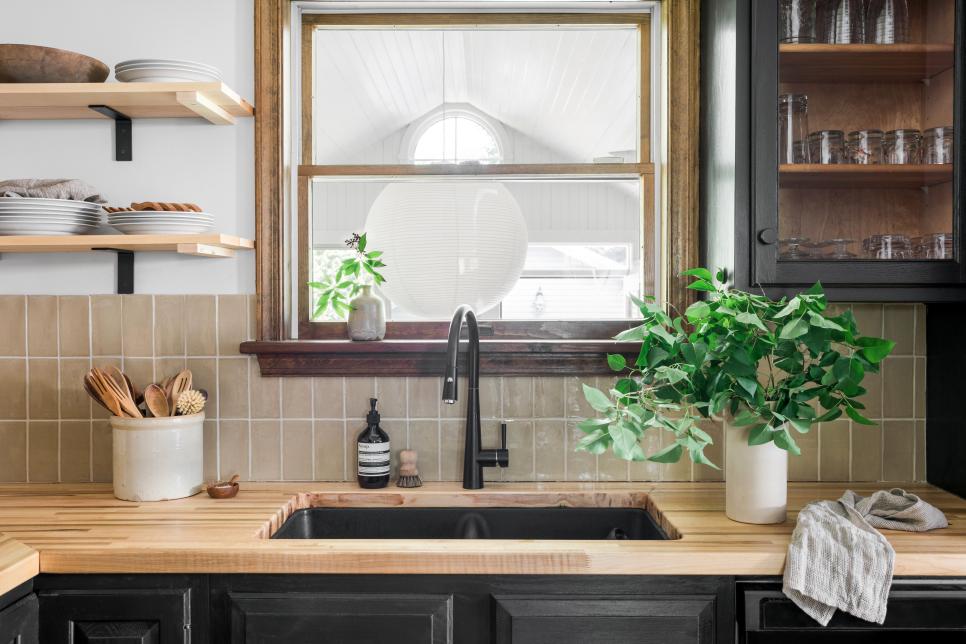
Butcher block countertops also offer a level of versatility that other countertop materials might lack. They can be used for the entire kitchen or as an accent piece, such as on an island or a specific work area. This allows homeowners to incorporate the warm, natural aesthetic of wood without committing to an entire kitchen of butcher block. The ability to mix and match materials can lead to a more dynamic and personalized kitchen design, where different surfaces are chosen for different functions.
While butcher block countertops have many advantages, they are not without their challenges. One potential issue is their susceptibility to moisture damage. Wood is porous, and if not properly sealed, it can absorb water, leading to warping, staining, or even mold growth. To avoid these problems, it’s crucial to keep the countertops sealed and to wipe up spills promptly. Additionally, placing hot pots and pans directly on the wood can cause burns or discoloration, so using trivets or hot pads is essential to protect the surface.
Despite these challenges, many homeowners find that the benefits of butcher block countertops far outweigh the potential downsides. The ability to sand and refinish the surface means that even if the countertop does suffer damage, it can be restored to its original condition. This long-term durability, combined with the aesthetic appeal and functionality of butcher block, makes it a popular choice for kitchens across a wide range of styles and budgets.
One of the more appealing aspects of butcher block countertops is their cost. Compared to other high-end countertop materials like granite or quartz, butcher block is relatively affordable. This makes it an attractive option for homeowners looking to upgrade their kitchen without breaking the bank. Additionally, because butcher block is easy to install, some homeowners opt to tackle the installation as a DIY project, further reducing costs.

Butcher block countertops also contribute to a healthier kitchen environment. Wood has natural antibacterial properties, which can help to keep your kitchen cleaner and safer. While it’s still essential to practice good hygiene, such as regularly cleaning the countertop and using separate surfaces for raw meat, the antibacterial nature of wood can provide an extra layer of protection. This is particularly appealing to families with young children or anyone concerned about food safety.
The aesthetic appeal of butcher block countertops cannot be overstated. The natural wood grain adds a touch of elegance and warmth to the kitchen, creating a welcoming atmosphere. Whether you prefer the clean, light look of maple or the rich, dark tones of walnut, there’s a butcher block countertop to suit every taste. The ability to customize the finish further enhances the aesthetic options, allowing you to create a truly unique kitchen.
In addition to their aesthetic and functional benefits, butcher block countertops can also add value to your home. Kitchens are often a focal point in home design, and high-quality countertops can be a major selling point. A well-maintained butcher block countertop can make your kitchen more appealing to potential buyers, adding to the overall value of your home. Even if you’re not planning to sell anytime soon, investing in a butcher block countertop can enhance your enjoyment of your kitchen for years to come.
Finally, butcher block countertops are a timeless choice. While trends in kitchen design come and go, the classic appeal of wood remains constant. Whether you’re designing a kitchen from scratch or updating an existing space, butcher block countertops offer a blend of beauty, durability, and functionality that few other materials can match. With proper care and maintenance, they can last for decades, making them a worthwhile investment for any kitchen.
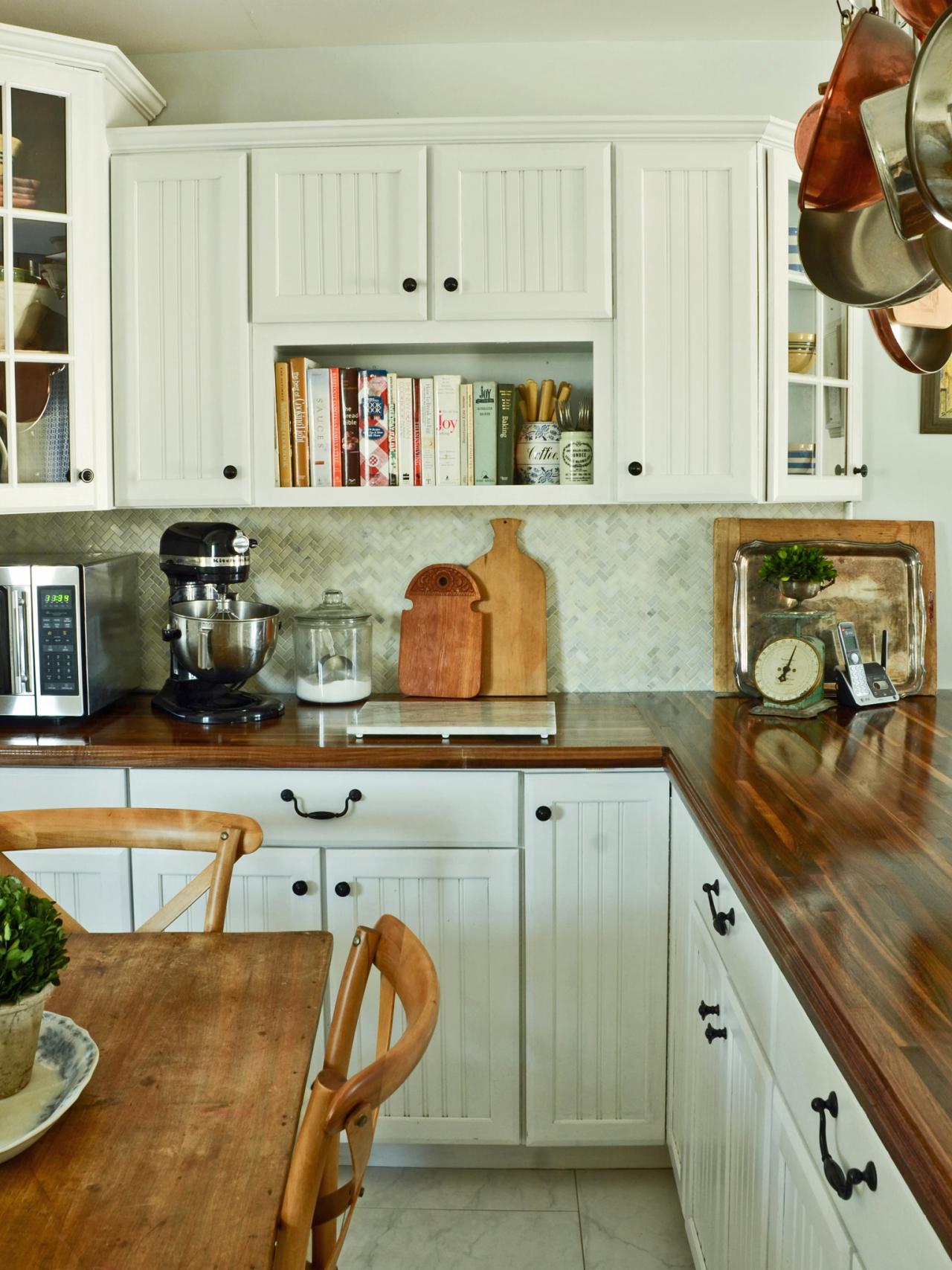
Common Mistakes to Avoid:
When installing or maintaining butcher block countertops, several common mistakes can affect their longevity and appearance. First, failing to seal the wood properly is a major error. Without a protective seal, the wood is vulnerable to moisture, which can lead to warping, staining, and even mold growth. Make sure to apply a food-safe sealant regularly to keep the wood in good condition.
Another mistake is not wiping up spills immediately. Even with proper sealing, prolonged exposure to moisture can cause damage, so it’s essential to clean up any spills as soon as they happen. Using harsh cleaning chemicals is another pitfall to avoid. These can strip the wood of its natural oils and cause it to dry out or discolor. Instead, opt for gentle, non-abrasive cleaners.
Additionally, placing hot pots and pans directly on the countertop can leave burn marks or discoloration, so always use a trivet or hot pad. Finally, neglecting to sand and refinish the countertop when needed can lead to a worn, unsightly appearance. Regular maintenance, including sanding and resealing, is key to keeping your butcher block countertops looking their best.
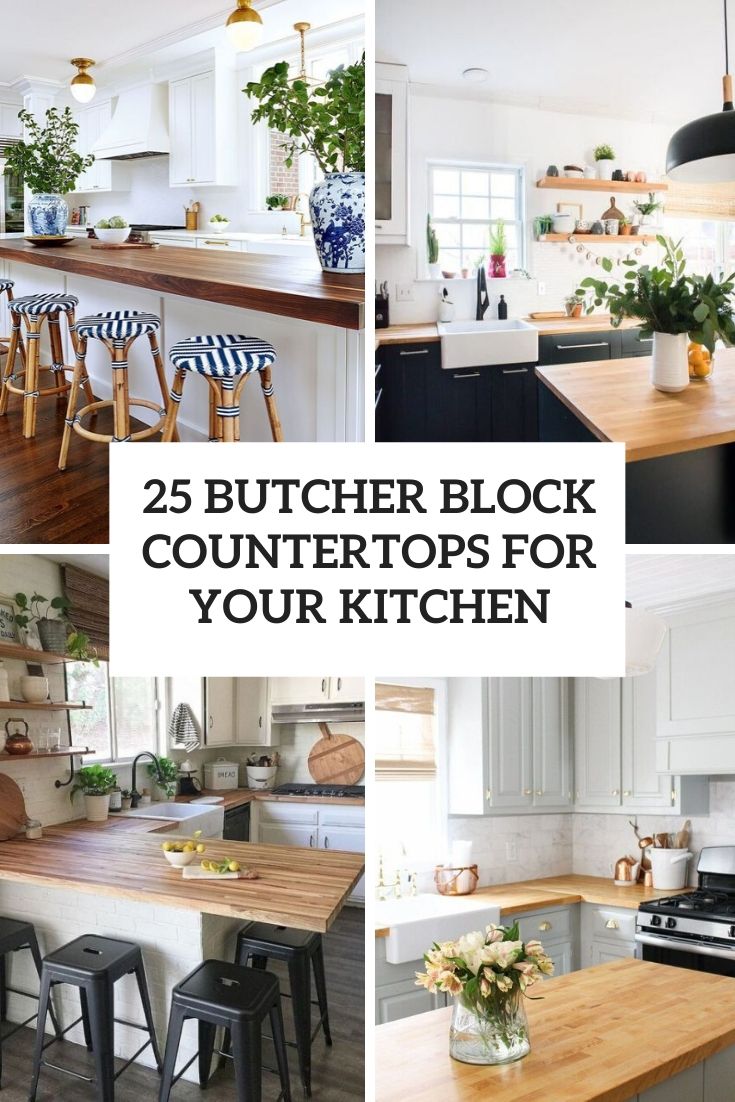
How often should I seal my butcher block countertops?
The frequency of sealing depends on the type of wood and the finish you choose, but generally, it’s recommended to seal butcher block countertops every 3 to 6 months. If your countertops see heavy use, you might need to seal them more often. A good rule of thumb is to check the surface; if it starts to look dry or water no longer beads on it, it’s time to reseal.
Can I use my butcher block countertops as a cutting board?
Yes, you can use butcher block countertops as a cutting surface, but keep in mind that doing so may cause scratches and cuts on the wood. These can add character over time, but if you prefer to keep your countertops looking pristine, it’s a good idea to use a separate cutting board. If scratches do occur, they can be sanded out and the countertop can be resealed to restore its appearance.
What types of wood are best for butcher block countertops?
Common woods used for butcher block countertops include maple, oak, walnut, and cherry. Maple is a popular choice due to its durability and fine grain, while walnut offers a rich, dark appearance. Oak is known for its strength and distinctive grain pattern, and cherry provides a warm, reddish hue. The best wood for your countertop will depend on your personal aesthetic preferences and the overall design of your kitchen.

How do I clean and maintain butcher block countertops?
Cleaning butcher block countertops is straightforward but requires some care. Use a mild soap and water solution to clean the surface, avoiding harsh chemicals that can damage the wood. After cleaning, dry the countertop thoroughly to prevent moisture absorption. Regularly applying a food-safe oil or wax will help maintain the wood’s moisture balance and protect it from stains. Additionally, sanding and resealing the countertop every few years will keep it looking fresh.
Are butcher block countertops prone to staining?
Butcher block countertops can stain if not properly sealed and maintained. Stains are more likely if spills, particularly from acidic substances like wine or lemon juice, are not cleaned up quickly. However, many stains can be sanded out, and regular sealing will help prevent them from penetrating the wood. For everyday protection, it’s important to wipe up spills as soon as they occur and avoid placing wet items directly on the countertop for extended periods.
Can butcher block countertops be installed as a DIY project?
Yes, installing butcher block countertops can be a DIY project for those with some woodworking experience. The process involves measuring and cutting the wood to fit your kitchen layout, attaching it securely to the cabinets, and sealing the surface to protect it from moisture and stains. While it’s a relatively straightforward project, precision is key to ensuring a good fit and a professional finish. If you’re not confident in your skills, it may be worth hiring a professional to ensure the best results.
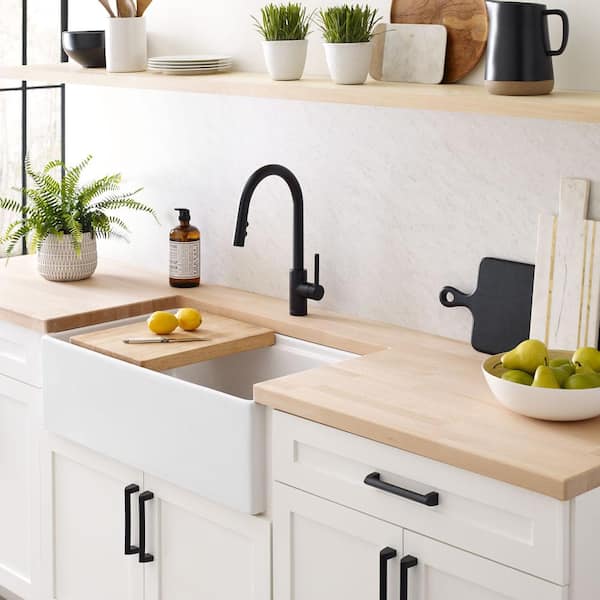
Beautiful Kitchens With Butcher Block Countertops Kitchen

Custom Butcher Block Countertops – Hardwood Lumber Company
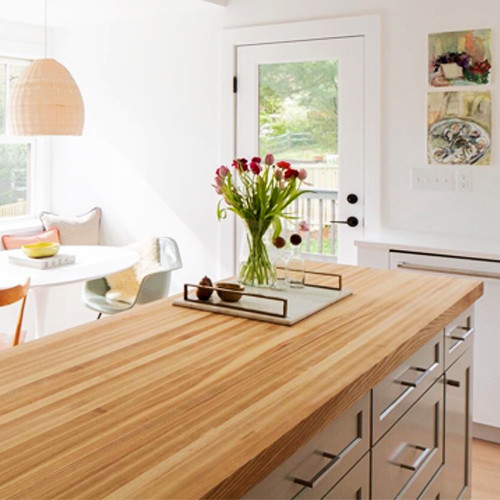
Related articles:
- Pine Butcher Block Countertops
- Butcher Block Countertops Walnut
- Maple Butcher Block Countertops
- Care Of Butcher Block Countertop
- Butcher Block Countertops Maintenance
- Antique Butcher Block Countertops
- Butcher Block Countertop Sealing
- Wood Butcher Block Countertop
- Thick Butcher Block Countertop
- How To Finish A Butcher Block Countertop